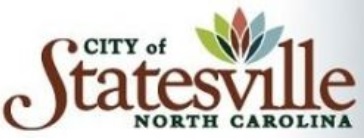
BY STACIE LETT CAIN
The Statesville City Council met on Friday to discuss the ongoing effects of the COVID-19 pandemic on city finances. Officials also discussed how best to address a large number homes in the city that do not meet minimum housing standards.
According to Finance Director Chris Tucker, the city has taken a hit in sales tax and hotel occupancy tax revenues since the pandemic began in March. Sales tax revenues for March and April were down by 4.64 percent and 7.83 percent, respectively, compared to last year.
The surprise, according to Tucker, was that sales tax revenues for May were actually 3.19 percent higher than last May.
“It was a pleasant surprise to see that for many of us,” Tucker explained. “We believe that was when people were seeing receipt of their stimulus checks and enhanced unemployment benefits.”
The flip-side to that will be that those increases will likely cease because of the termination of those enhanced benefits.
“We are waiting to see what the effects will be now that people are not receiving those increased amounts in unemployment,” Tucker explained. “It is something we need to be prepared for.”
Adding to that is the fact that there was very little back-to-school shopping, supply chain issues for some products, and the lack of group sporting and musical events, Tucker said.
Hotel occupancy tax revenues
In addition to decrease in sales tax, because of travel restrictions, there was a large decrease in the city’s hotel occupancy tax revenue.
“We are looking at a drop of 55 percent in the occupancy tax from this time last year,” Tucker told the council.
The city received $288,000 less in occupancy tax revenues than during over the same five-month period, March through July, in 2019.
Utility Revenues
Utility revenues, which continue to be fluid, have been unusually stable according to Tucker and Mayor Costi Kutteh. Although utilities are now being disconnected for non-payment, Statesville utilities customers have been reaching out to try to resolve past-due issues.
“It’s a tribute to our citizens that despite everything, they have managed to find a way to continue to keep their utility bills paid,” Kutteh said. “I’m not sure how they did it, but the percentage of accounts that had to be written off or disconnected was a fraction of what we could have been looking at and that speaks well to the dedication of our citizens to stay the course.”
Minimum housing standard enforcement
Another issue hashed over by the council was enforcement of minimum housing standards. Currently, there are 38 properties within the city limits that are subject to demolition because they do not meet current city standards. A total of 159 properties are on the watch list and could be downgraded with further deterioration.
Councilman John Staford said he facors an alternative to demolition.
“I would like to see third parties like churches or Habitat for Humanity get involved and work to put these houses back on our tax rolls,” Staford explained. “These minimum thresholds are very minimum and especially if these properties are owner occupied, I would like to see a way to keep people in their homes and not go through the demolition process.”
Planning Director Sherry Ashley was open to suggestions from council to rehabilitate these houses but admitted that current city staff numbers may make any further work load impossible.
“We are looking for a directive from this council as to how you want us to proceed with these houses,” Ashley explained, “especially the 38 that are targeted for demolition.”
Staford wanted to see the city post the addresses of the targeted properties to see if there were investors that may be interested in purchasing the properties for rehab. But Ashley said there are potential legal issues with that.
“Since we have not initiated foreclosure actions on these properties and do not own them, I would need some legal guidance as to whether we are legally able to post that information online,” she explained.
“In addition, if we posted information on 159 properties and asked people to call in if they were interested, we would be taxing the one person we have in our office that handles housing issues. We are really not appropriately staffed to handle that kind of interaction.”
The council decided that in addition to posting information about the properties the city will target the 50-plus homes on the lists that are owned by landlords for some personal encouragement.
“We need to bring these landlords in here and explain to them what is going to happen to give them an incentive to want to bring their properties up to minimum standards,” said Councilman William Morgan.
“They need to be read the riot act, so to speak, so they understand that we are very serious about people maintaining these standards.”



